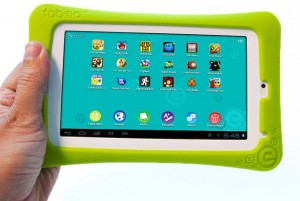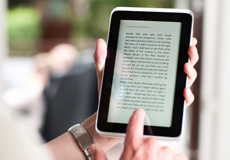By
Rob ScottOctober 21, 2013
According to new figures released by the Pew Internet & American Life Project, the number of Americans 16 and older who now own a tablet or e-book reader currently stands at 43 percent. The number of tablet owners has grown to 35 percent, while the share of e-reader devices has grown to 24 percent. Pew Research notes that device owners tend to live in upper-income households and have relatively high levels of education. The numbers also indicate that women are more likely to own e-readers. Continue reading Pew Research: Tablets and E-Readers See Significant Increase
By
Valerie SavranSeptember 10, 2013
We recently reported that Amazon has announced a new program called Kindle Matchbook that allows book enthusiasts to buy electronic versions of books that they have already purchased in print. In many cases, the program will allow customers to pay less than what they typically would for a standalone Kindle book. Customers will pay $2.99, $1.99, $0.99 — or nothing — for an electronic book they have already purchased in print. Continue reading Build Print and Digital Book Libraries with Kindle MatchBook
By
Rob ScottSeptember 5, 2013
Amazon unveiled its latest Kindle e-reader this week, an updated Paperwhite with improved front-screen lighting, greater contrast, more responsive touch panel and faster processor. Software updates will include integration of book recommendation site Goodreads, which the company purchased earlier this year. The new device is available for preorder for $119 — or $139 without ads — and will ship later this month. The $189 3G version will be released on November 5th. The online retailer also announced a program for buying discounted e-books. Continue reading Amazon Updates Kindle E-Reader Line with New Paperwhite
By
Rob ScottAugust 20, 2013
Now that Barnes & Noble is getting out of the tablet business, the company announced it is launching free Nook Video Apps for Android, iOS and Roku devices. The new apps enable users to purchase or rent movies for streaming and includes integration with individuals’ UltraViolet collections. No longer keeping content exclusive to Nook devices, the retailer has also updated its Android and iOS e-reader apps with the ability to read Nook Comics titles, previously not available outside of the Nook ecosystem. Continue reading Nook Video Apps Now Available for iPad and Android Tablets
By
Chris CastanedaJune 27, 2013
Barnes & Noble announced this week that it will stop producing its own color tablet e-reader, the Nook, in favor of third party, co-branded devices. The company’s decision may reflect a trend in the decline of dedicated e-readers competing with the growing popularity of tablet devices. Consumers are looking to tablets, which have more features and apps available, including e-reader capability, compared to standalone e-readers. Continue reading In the Wake of Heavy Losses, Future of Nook is Uncertain
Sony may soon offer an affordable alternative for transitioning from paper notebooks and textbooks to digital solutions. According to a Japanese press release, the company is developing a 13.3-inch flexible e-reader called Digital Paper. Designed for use in classrooms, the grayscale reader weighs about 0.78 pounds, is a mere 7mm thick, features a touch capable 1,200 x 1,600 pixel display and includes Wi-Fi, 4GB of internal memory and a microSD card slot. Continue reading Digital Paper: Sony Announces Ultra-Thin Flexible E-Reader
According to internal documents obtained by TechCrunch, Microsoft is pursuing a $1 billion purchase of the digital assets of Nook Media LLC, the digital book joint venture between Barnes & Noble and investors. “In this plan, Microsoft would redeem preferred units in Nook Media, which also includes a college book division, leaving it with the digital operation — e-books, as well as Nook e-readers and tablets.” Continue reading Microsoft Reportedly to Pay $1 Billion for Nook Digital Assets
The Web-based reader “StorEbook” has expanded on the idea of computers interacting with users via voice technology. During last week’s Foundry event, the audio book’s “voice synthesis engine” was demonstrated as it recited the classic tale “Goldilocks and the Three Bears.” The Web-based app, which uses AT&T’s Natural Voices, provides story characters with multiple voices, creating a new dynamic to the idea of “story time.” Continue reading New StorEbook Reader Uses Natural Voices to Tell Stories
Amazon announced it will purchase the popular book discovery and recommendation website Goodreads, a social service that centers on book recommendations and reviews. The acquisition — which comes at a time when readers are increasingly turning to tablets and e-readers to search for authors and books — could help push Amazon ahead of competitors Apple and Google in e-book retailing. Continue reading Amazon to Acquire Goodreads for Competitive E-Book Edge



